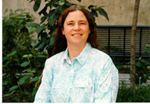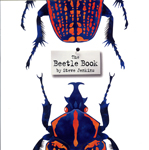
Recognition and praise from Debbie Reese, a Nambe Pueblo Indian woman, for Lincoln Public Schools project to help classroom teachers select books that do not perpetuate stereotypes of cultures. See her blog posting of Betsy McEntarffer’s article
here. Debbie Reese’s blog is a good place to visit to find out more about what is, and is not, acceptable to her culture. I especially appreciated her side panel that told me to refer to her as “a Nambe Pueblo Indian woman” instead of some other terms I was considering. Debbie posted this link to her blog on the YALSA-BK mail group (Young Adult Library Services Association), which you could also join if you don’t mind a lot of email. She alerts members to concerns or praise in new books as they are published.
 The Beetle Book
The Beetle Book by Steve Jenkins has incredible illustrations (of course!) and basic information about the huge order of creatures called beetles. Jenkins first introduces the basic physical design of beetles after which each two-page spread discusses activities of beetles such as different ways they communicate, what they eat, ways they protect themselves, and how they move. Jenkins notes at the beginning of the book, “Line up every kind of plant and animal on earth and one of every four will be a beetle.” Each two-page spread has two to twelve illustrations all on a white background. Many of the pages have silhouettes showing the beetles’ actual size. Aimed at upper elementary and early middle school readers it is great for bug fans and browsers – just open the book to any page and begin reading. Reluctant readers will likely do just that.
(The Nebraska Library Commission receives free copies of children’s and young adult books for review from a number of publishers. After review, the books are distributed free, via the Regional Library Systems, to Nebraska school and public libraries.)
 Recognition and praise from Debbie Reese, a Nambe Pueblo Indian woman, for Lincoln Public Schools project to help classroom teachers select books that do not perpetuate stereotypes of cultures. See her blog posting of Betsy McEntarffer’s article here. Debbie Reese’s blog is a good place to visit to find out more about what is, and is not, acceptable to her culture. I especially appreciated her side panel that told me to refer to her as “a Nambe Pueblo Indian woman” instead of some other terms I was considering. Debbie posted this link to her blog on the YALSA-BK mail group (Young Adult Library Services Association), which you could also join if you don’t mind a lot of email. She alerts members to concerns or praise in new books as they are published.
Recognition and praise from Debbie Reese, a Nambe Pueblo Indian woman, for Lincoln Public Schools project to help classroom teachers select books that do not perpetuate stereotypes of cultures. See her blog posting of Betsy McEntarffer’s article here. Debbie Reese’s blog is a good place to visit to find out more about what is, and is not, acceptable to her culture. I especially appreciated her side panel that told me to refer to her as “a Nambe Pueblo Indian woman” instead of some other terms I was considering. Debbie posted this link to her blog on the YALSA-BK mail group (Young Adult Library Services Association), which you could also join if you don’t mind a lot of email. She alerts members to concerns or praise in new books as they are published.
 The Beetle Book by Steve Jenkins has incredible illustrations (of course!) and basic information about the huge order of creatures called beetles. Jenkins first introduces the basic physical design of beetles after which each two-page spread discusses activities of beetles such as different ways they communicate, what they eat, ways they protect themselves, and how they move. Jenkins notes at the beginning of the book, “Line up every kind of plant and animal on earth and one of every four will be a beetle.” Each two-page spread has two to twelve illustrations all on a white background. Many of the pages have silhouettes showing the beetles’ actual size. Aimed at upper elementary and early middle school readers it is great for bug fans and browsers – just open the book to any page and begin reading. Reluctant readers will likely do just that.
(The Nebraska Library Commission receives free copies of children’s and young adult books for review from a number of publishers. After review, the books are distributed free, via the Regional Library Systems, to Nebraska school and public libraries.)
The Beetle Book by Steve Jenkins has incredible illustrations (of course!) and basic information about the huge order of creatures called beetles. Jenkins first introduces the basic physical design of beetles after which each two-page spread discusses activities of beetles such as different ways they communicate, what they eat, ways they protect themselves, and how they move. Jenkins notes at the beginning of the book, “Line up every kind of plant and animal on earth and one of every four will be a beetle.” Each two-page spread has two to twelve illustrations all on a white background. Many of the pages have silhouettes showing the beetles’ actual size. Aimed at upper elementary and early middle school readers it is great for bug fans and browsers – just open the book to any page and begin reading. Reluctant readers will likely do just that.
(The Nebraska Library Commission receives free copies of children’s and young adult books for review from a number of publishers. After review, the books are distributed free, via the Regional Library Systems, to Nebraska school and public libraries.) 
